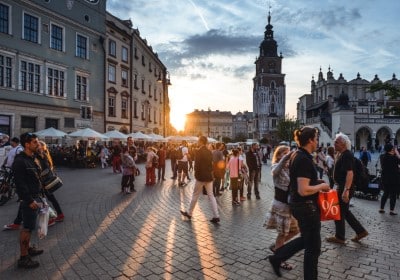
To get Polish citizenship, you don’t need a Polish birth certificate. Polish citizenship law states that if you can prove Polish descent of a Polish ancestor, you may be eligible to become a Polish citizen by descent.
The prerequisites include establishing a direct ancestral link to a Polish national, such as a parent, grandparent, or great-grandparent, and providing verifiable documentation that substantiates this familial connection, including birth certificates, marriage records, and related materials.
Below, we’ll give you an overview of Polish citizenship law, the benefits of citizenship and the processes of becoming a Polish citizen.
About Poland
Poland, located in Central Europe, is known for its rich history, vibrant culture, and resilient economy. With a diverse landscape encompassing mountains, forests, and the Baltic Sea coastline, it offers scenic beauty and recreational opportunities. Its dynamic cities, including Warsaw and Krakow, feature stunning architecture, historical landmarks, and a burgeoning arts scene.
Poland has undergone significant economic transformation since the 1990s, embracing market-oriented reforms and becoming a regional economic powerhouse. Despite challenges, it continues to attract foreign investment, particularly in sectors such as manufacturing, information technology, and services, contributing to its ongoing development and growth.
What It Means To Be a Polish Citizen

Embracing Polish citizenship entails celebrating a vibrant cultural heritage manifested through literature, music, and visual arts while cherishing traditions like pierogi (traditional Polish dumplings) and festive customs. It entails commemorating historical milestones such as the Solidarity movement and paying homage to illustrious figures like Copernicus and Chopin, fostering a strong sense of unity and belonging within the Polish community.
The Polish Citizenship Act
From a political point of view, the Polish Citizenship Act, statutory since 1962, outlines the legal framework governing the acquisition, retention, and loss of Polish citizenship. It specifies the conditions under which individuals can obtain citizenship and simultaneously, also become EU citizens, including through birth, descent, naturalization, or restoration.
The act defines the rights and obligations of Polish citizens, outlining their entitlements to protection and assistance from the Polish government, as well as their responsibilities towards the state. It also delineates the procedures for renunciation or loss of citizenship, emphasizing the circumstances under which citizenship can be forfeited.
The Polish Citizenship Act is crucial in defining the legal parameters and regulations surrounding Polish nationality.
Benefits of Polish Citizenship

With Poland being a member of the European Union (EU), Polish citizens possess the right to live, work, and study in any EU member state, enhancing career prospects and educational opportunities within the EU. They can actively participate in the democratic processes of the European Union, exerting influence on policies and decisions that affect the region.
Additionally, Polish citizenship grants access to various social welfare benefits and healthcare services within Poland and the broader EU.
The Polish Passport
According to the Global Passport Index, the Polish passport ranks at number 30, giving visa-free access to 174 countries. What’s more, as an EU member state, Poland provides its passport holders with the right to live, work, and study in any EU country, broadening educational and career prospects across the European continent.
The Polish passport enables individuals to participate in democratic processes and benefit from consular protection offered by Polish diplomatic missions worldwide. Additionally, it provides access to comprehensive healthcare and social services within Poland and other EU nations.
Polish Citizenship by Descent
Polish citizenship by descent is a legal provision that enables individuals with Polish ancestry to claim Polish citizenship. Eligibility typically extends to those who have at least one Polish parent, grandparent, or, in some cases, great-grandparent. Applicants must provide documented evidence establishing their familial link to a Polish citizen.
Meeting the specified criteria allows individuals to acquire Polish citizenship without the need for residency in Poland or passing a language exam. Polish citizenship by descent grants holders the same rights and privileges as those obtained through other naturalization processes, including the ability to live, work, and study within the European Union.
Eligibility Criteria for Polish Citizenship by Descent

Applicants must provide documented evidence, such as birth certificates, marriage records, or other official documents, establishing their familial connection to a Polish citizen. This evidence must be obtained from Polish authorities or the relevant authorities in countries outside of Poland where the documents are held.
Moreover, the verification process asks for the provision of authenticated translations if the documents are not in Polish. It’s imperative to ensure the legitimacy of these documents to avoid any hindrances during the application process.
Additional requirements might include proof of the continuous transmission of Polish citizenship through generations, particularly for cases where individuals seek to claim citizenship through their great-grandparents.
Sticking to the stipulated guidelines and providing thorough documentation strengthens the chances of successfully acquiring Polish citizenship by descent. It is advisable to consult with legal experts specializing in Polish citizenship matters to navigate the process efficiently and ensure compliance with all the necessary criteria.
Polish Citizenship by Descent: Requirements
To successfully acquire Polish citizenship by proving your Polish roots, you’ll need the following:
- The birth certificate of the candidate and that of their ancestor
- The marriage certificates of the candidate’s parents and grandparents, if applicable
- At least one of your ancestors’ passports or identity documents, if accessible
- Documents that have been both legalized and translated, if not originally in Polish or English
- Evidence of Polish lineage, which might comprise ancient family archives or paperwork of your Polish ancestors
- Receipts of application fees and administrative expenses to prove to the Polish authorities that any costs have been settled
Steps to Obtain Polish Citizenship by Descent
You can expect the following steps when starting your application:
- Validate eligibility: Ensure that you fulfill the eligibility requirements. Meeting these criteria means having a direct familial connection to a Polish national and not having renounced or lost Polish citizenship through legal means.
- Collect and research necessary paperwork: Conduct comprehensive research on the mandatory documentation and gather them meticulously. This typically includes birth certificates, marriage records, and proof of Polish heritage.
- Authenticate and interpret documents: If your documents are not in either Polish or English, ensure their translation and authentication by certified authorities for official purposes. A certified translator or notary can help you with this.
- Make the application: Thoroughly complete the application form, including all required details and supporting documents in line with the prescribed guidelines.
- Settle application fees and administrative charges: Ensure you have paid all applicable charges and administrative expenses.
- Await processing and assessment: Allow for the processing of your application as the authorities meticulously scrutinize it, verifying the genuineness of the documents and confirming your eligibility.
- Participate in interviews or appointments (if necessary): Attend any interviews or appointments arranged by the relevant authorities if they are part of the process.
- Receive confirmation of citizenship: Once your application has been approved, expect to receive official confirmation of your Polish citizenship by descent, granting you the corresponding rights and privileges.
- Secure a Polish passport and identity documents: Apply for a Polish passport and identity card to establish your official citizenship status.
Applying for a Polish passport

This includes a completed application form, recent photographs, and proof of Polish citizenship, such as your confirmation of citizenship. Check if you need to make an appointment at the nearest Polish Consulate or Embassy. At the appointment, submit the application, pay the fee, and provide any supplementary documents as required.
Finally, allow for the processing time, usually a few weeks. Once approved, collect the passport in person or via mail. Verify the information for accuracy and promptly sign the document upon receipt.
Other Ways to Obtain Polish Citizenship
Apart from Polish citizenship by descent, individuals can acquire Polish citizenship through naturalization, which involves residing legally in Poland for a specified period, usually a minimum of several years, demonstrating a stable source of income, and passing a Polish language proficiency exam.
The option of obtaining citizenship through marriage to a Polish citizen is also available, requiring a certain period of uninterrupted residency in Poland. Additionally, individuals of Polish origin who lost their citizenship due to historical circumstances may be eligible for citizenship restoration, provided they meet specific legal criteria and demonstrate a link to Polish heritage.What’s more, Poland is one of the easiest countries to get citizenship in through a residence permit in exchange for investment in its economy. You can also invest in real estate, although you’ll have to get a special permit from the Polish Ministry.
Key Takeaways Concerning Polish Citizenship

Although applicants have to follow meticulous documentation and application procedures, beyond the administrative process lies an invitation to immerse in language, traditions, and customs, shaping the Polish identity. This pursuit unfolds a remarkable chapter marked by newfound connections, a reinforced identity, and an enduring admiration for Poland’s rich cultural legacy.
Frequently Asked Questions about Polish Citizenship by Descent
What are the rules for obtaining Polish citizenship?
The guidelines for acquiring Polish citizenship typically require proof of lineage to a Polish citizen, absence of renunciation, and adherence to the necessary documentation and application procedures, alongside fulfilling specific residency or language requirements if applicable.
How can I determine if I am eligible for Polish citizenship by descent?
You can confirm eligibility for Polish citizenship by descent by assessing if you have direct lineage to a Polish citizen without any renunciation of citizenship. Additionally, verify the fulfillment of documentation requirements and other necessary criteria for application submission.
Can I apply for Polish citizenship by descent if I have a criminal record?
Eligibility for Polish citizenship by descent typically involves meeting certain criteria, which may include having a clean criminal record. It’s advisable to review specific legal requirements and consult official resources for precise information on this matter.
Can I keep my current citizenship while obtaining Polish citizenship by descent?
In many cases, getting Polish citizenship by descent does not necessarily require renouncing your existing citizenship. It’s recommended to review the relevant laws, as dual citizenship is allowed under Polish regulations, but you may need to check the laws of your current country to see which countries allow dual citizenship.
Do I need to speak the Polish language to apply for citizenship by descent?
No, you don’t have to speak Polish to claim Polish citizenship by descent. You only need to prove your Polish ancestry.
Do I need to visit Poland during the citizenship application process?
In many cases, physical presence in Poland might not be mandatory for the citizenship application process. However, certain situations may warrant visits, such as appointments or interviews. You should review specific requirements outlined by Polish authorities for precise information.
an I apply for Polish citizenship for my children if I obtain it through descent?
Once you have received confirmation of Polish citizenship, it is often possible to apply for Polish citizenship for your children, provided they meet the necessary eligibility criteria.



